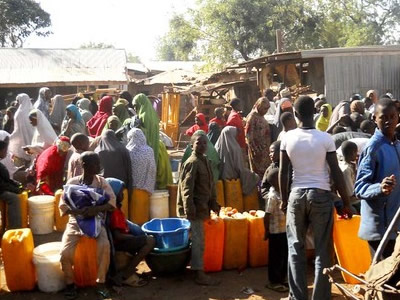Water scarcity has again hit Sokoto metropolis as students and civil servants now abandon their studies and offices in seacrh for portable water.
Civil Servants now resort to using their official vehicles to fetch water before reporting to office.
The water shortage has since began to pose health danger. The rampant consumption of contaminated water sourced from river Kware in the outskirts of the city has started to exhibit the symptoms of the outbreak of cholera epidemic among the poor citizens.
Many under-aged children, students and old women are seen with buckets, bowls and calabash trekking to long distance places to fetch water for domestic and other usages. Some primary and secondary school students are engaged for the same purpose by the parents; thereby distracting their academic activities.
Water vendors are seen in the brisk water business as one jerry can of twenty litrers is sold between N200 to N300. Most affected areas of the city facing the acute water scarcity include Guiwa, Runjin Sambo, Gidan Igwai, Gidan Haki, Marina Tsamiyya, Kofar Rini, Kofar Atiku and Alkamawa. Other areas are Kofar Kware, Tashar Illela and Makera Assada.
Speaking on the water shortage in Sokoto, one of the officials of the State Water Board described the situation as embarrassing and a clear manifestation failure, poor management and lack of commitment by the leadership of the Water Board and the Ministry of Water Resources.
He disclosed that new chemicals which were procured for water treatment by the State Government were nowhere to be found in the stores of the Ministry of Water Resources. This, according to him, makes the whole situation so deceitful as are no water treatment chemicals to be used by the State Water Board in spite of millions of naira budgeted for that purpose.
He further confided that the chemicals all along supplied to the State Water Board were of inferior quality and very dangerous to the for human consumption of water treated and supplied to public.
Last week, during State Council meeting, Governor Aliyu Wamakko frowned at the method used by the Water Board in the distribution of water in the metropolis. However, an insider confided that the Water Board is handicapped in term of resources as they receive less on fueling their generators and payment to NEPA bills.
Apart from that, the State Water Board was managed by politicians instead of professional water engineers who are sidelined in taking any decisions affecting their job operations.
Another source states that, “In Sokoto, contractors are more superiors and powerful in policy formulations and execution than the professional bureaucrats, and even the Executive Officers heading Agencies who have seen been confined to ceremonial schedules of signing of the payment vouchers”



